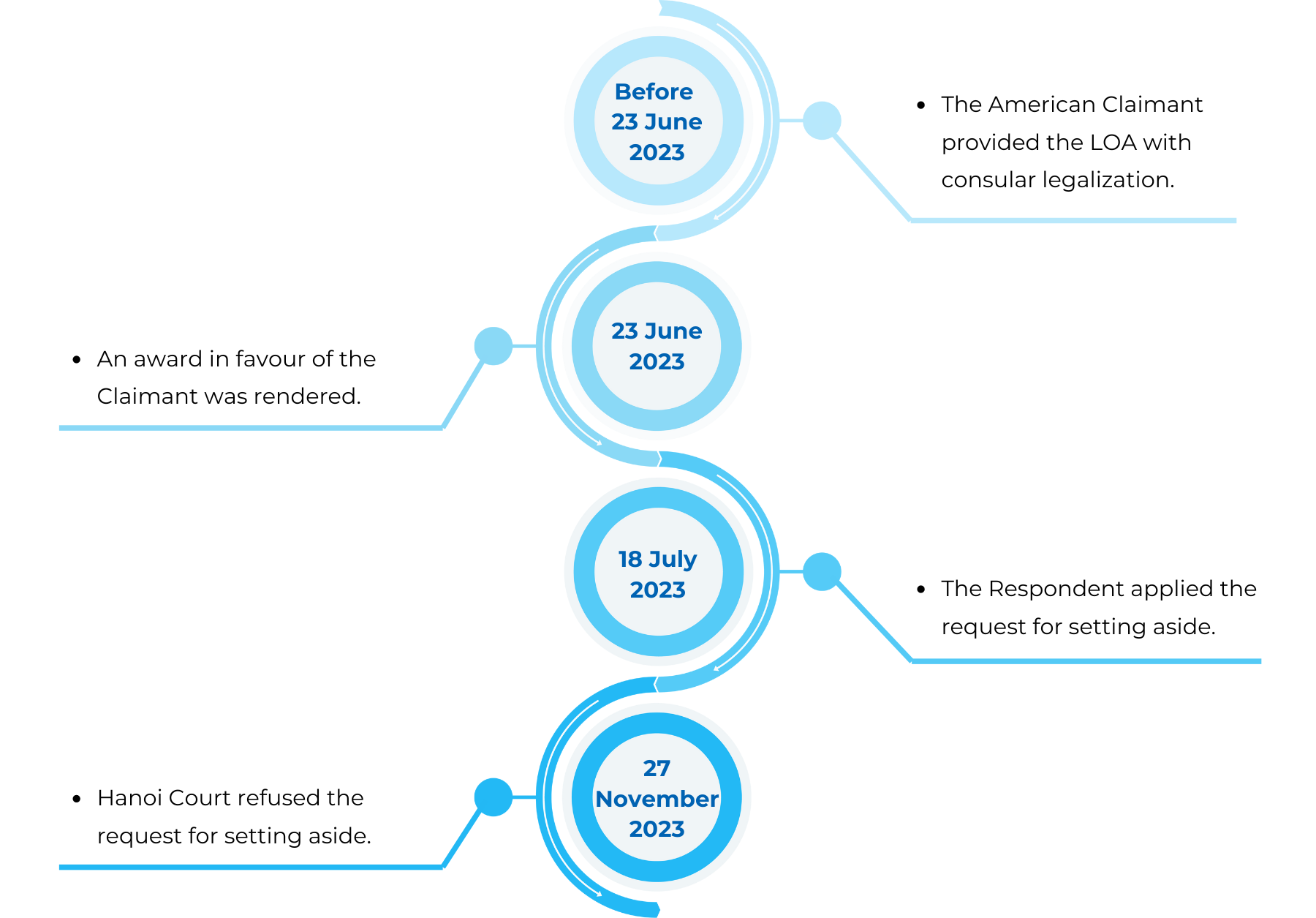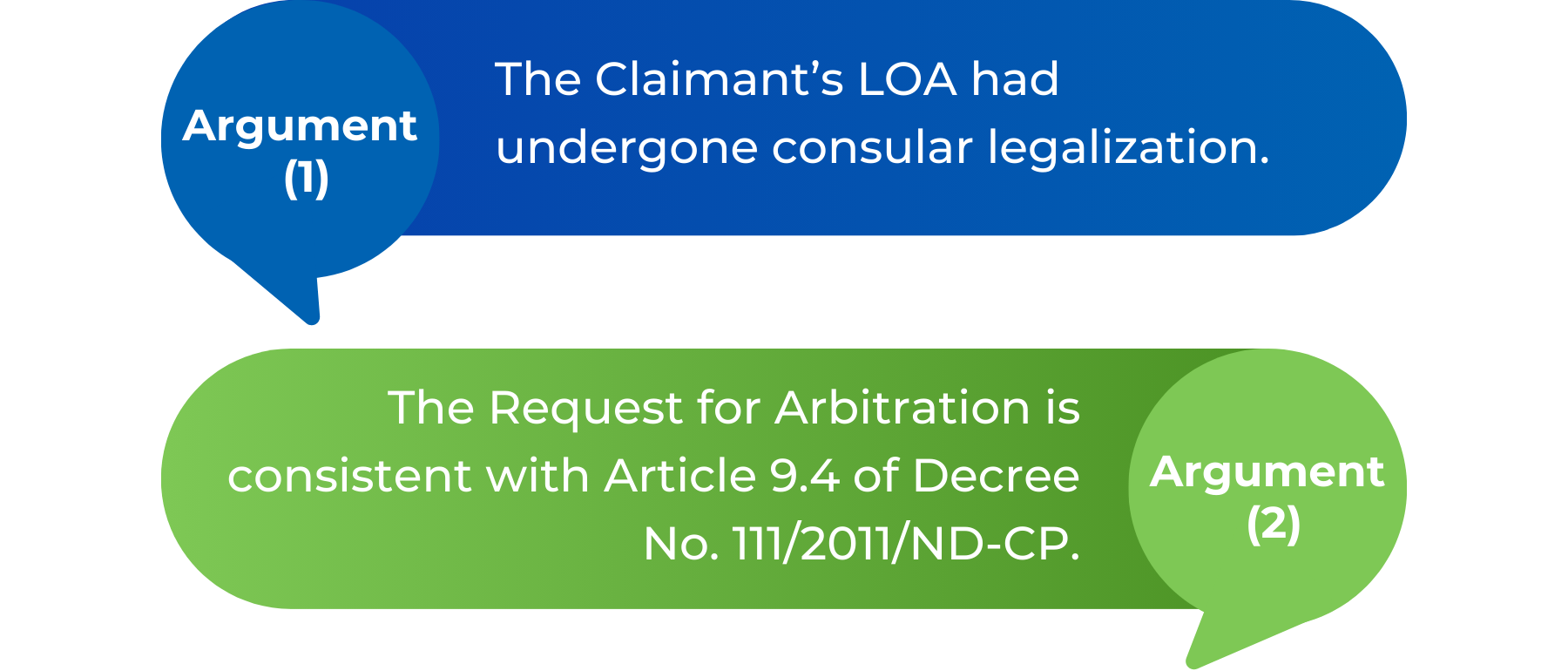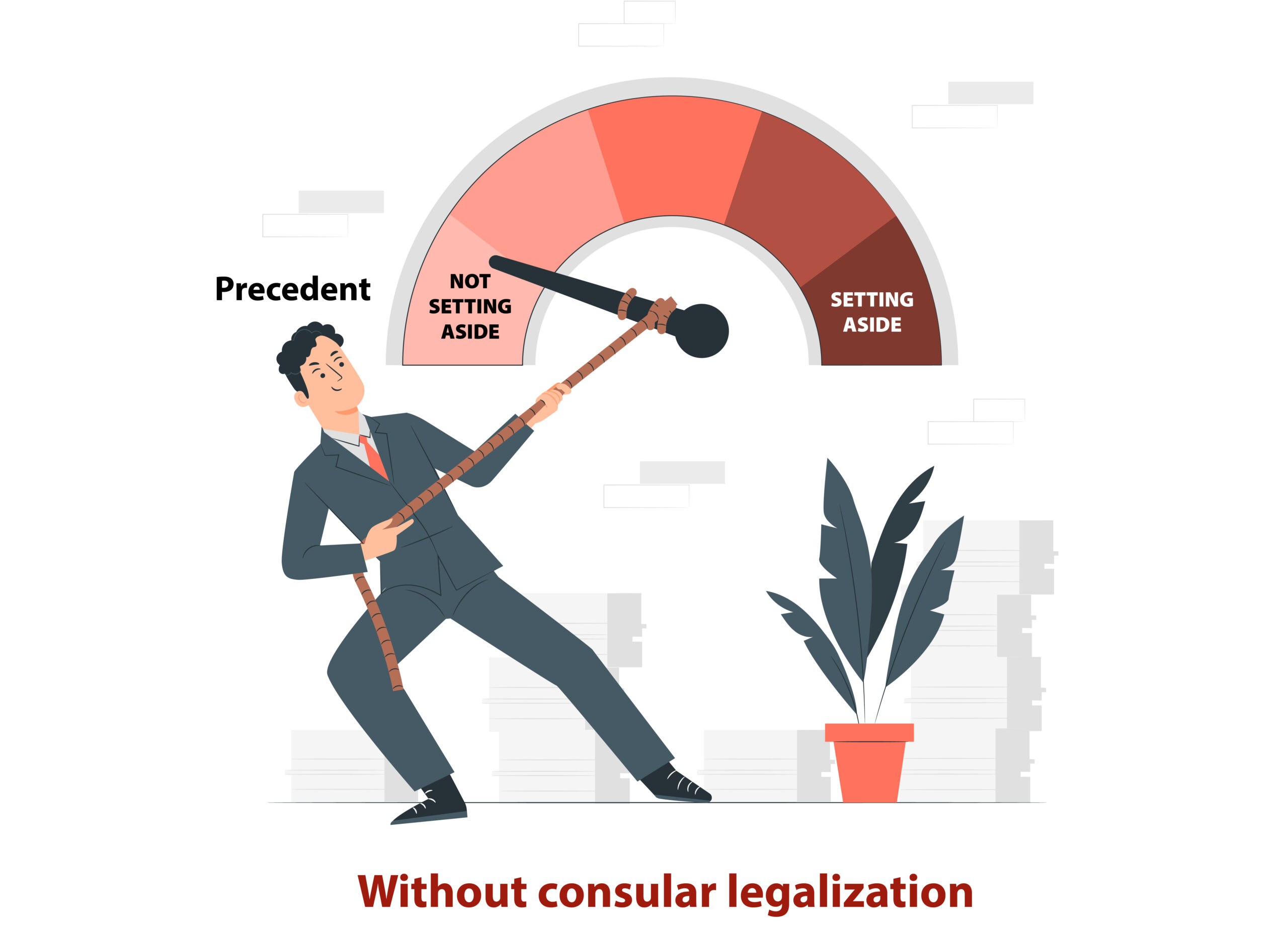Whether documents in arbitral proceedings shall be undergone consular legalization or not is a debated issue in Vietnamese Courts’ practice. This issue causes the concerns and risks to the relevant parties, especially who are foreign parties.
In Courts’ practice, several arbitral awards has been set aside by the Courts on the ground that the documents used in arbitral proceedings had yet to undergone consular legalization.
This situation makes the arbitration activities in Vietnam at risk, which is inconsistent with international practice in commercial activities and international arbitration, and becomes less flexible, effective and prompt.
However, this issue may be solved completely if the Supreme People’s Court officially passes the Draft of Precedent No. 15/2024 (hereafter referred to as “Draft”) in favour of the view that it is unnecessary to undergo consular legalization of documents used in arbitral proceedings, based on a Decision of the People’s Court of Hanoi City (“Hanoi Court”) in November 2023.
For more details, CNC shall introduce to readers this article undertaken by Mr. Tran Pham Hoang Tung – Senior Associate and Mr. Pham Nguyen Tan Trung – Legal Assistant.
Download file PDF here: Vietnam’s Precedent on Consular legalization of documents in arbitration is coming
Case summary
In 2022, a company, whose headquarters is located in the United States, filed a request for arbitration against a Vietnamese company at an arbitration center named V relating to a dispute arising out of a contract for the sale of goods.
During the arbitral proceedings, the Claimant provided a Letter of Authorization dated 05 January 2023 including consular legalization as requested by the arbitral tribunal. Accordingly, Mr. J – the legal representative of the Claimant authorized 02 individuals in Vietnam to represent the Claimant in the arbitral proceedings (hereafter referred to as “Letter of Authorization” or “LOA”).
LOA contains the following phrase: “confirmed and approved any work that authorized individuals had done, will do or have the intention to do legally by this letter of authorization, including the confirmation and approval of any work done honestly and in good faith on behalf of the Company to perform and complete the authorized tasks”.
On 23 June 2023, the arbitral tribunal rendered an arbitral award in favour of the Claimant.
On 18 July 2023, the Respondent filed the request for setting aside this arbitral award to Hanoi Court. One of many grounds given by the Respondent is that the award is contrary to the fundamental principles of the laws of Vietnam. Specifically, the award has violated Article 4.2 of Decree No. 111/2011/ND-CP dated 05 December 2011 of the Government on consular certification and legalization since the arbitral tribunal accepted the Request for Arbitration which has yet to undergo consular legalization.
On 27 November 2023, Hanoi Court rendered Decision No. 16/2023/QD-PQTT (“Decision 16”), refusing the request for setting aside the arbitral award of the Respondent.

Summary of the Hanoi Court’s reasonings referred in the Draft
Basically, Hanoi Court provided two arguments to affirm that it is unnecessary to undergo consular legalization of the Request for Arbitration submitted to the arbitration center. To be specific:
(1) The Claimant’s LOA had undergone consular legalization and was submitted to the tribunal as requested. The content of LOA could be interpreted to have included the signing of the Request for Arbitration before the date on which LOA completed its consular legalization procedures.
(2) The Request for Arbitration submitted to the arbitration center is a document that are exempted from consular legalization as provided in Article 9.4 of Decree No. 111/2011/ND-CP.

These arguments are shown in Finding No. [6] and [7] of Decision 16, which is the part that has been recommended to be made into precedent, specifically:
- Legal issue: The applicant files a request for setting aside the arbitral award on the ground that the Tribunal did not request relevant parties to undergo consular legalization on overseas documents that have been submitted in Vietnam’s commercial arbitration.
- Legal solution: In such case, the Court shall determine that it is unnecessary to undergo consular legalization of these documents since there is no request from the recipient, which is Vietnam’s commercial arbitration, unless otherwise provided by the arbitration rules.
Comments on the reasonings in the Draft
In our opinion, Finding No. [6] and [7] listed above is considered reasonable and consistent with the legal framework of Vietnam to prove that it is unnecessary to undergo consular legalization of documents used in arbitral proceedings. To be specific:
Firstly, in nature, the consular legalization of overseas documents is simply the certification of the stamp, signature and titles on documents for recognition and use in Vietnam, without any certification of the content and form of these documents.[1] In other words, it does not mean that the Request for Arbitration of foreign Claimant without consular legalization has no legal value, if the Claimant has sufficient grounds to prove its true intention which is to file the request for arbitration in Vietnam.
In the case of the Draft, the Claimant submitted LOA including consular legalization to authorize 02 individuals in Vietnam to represent the Claimant in arbitral proceedings in general and to represent to sign the Request for Arbitration (without consular legalization) that had been submitted previously in arbitration center in particular. Thus, the arbitral tribunal determined it is unnecessary to undergo consular legalization of documents the Request for Arbitration. This argument was accepted by Hanoi Court then.
Secondly, Decree No. 111/2011/ND-CP provides that overseas documents shall undergo consular legalization “unless Article 9 of this Decree provides otherwise” to be accepted and used in Vietnam[2] – it is the ground cited by Hanoi Court. To be specific, Article 9.4 of Decree No. 111/2011/ND-CP provides as follows:
“Papers and documents where consular certification and legalization is not required by Vietnamese or foreign receiving agencies in accordance with relevant Vietnamese or foreign laws.”
The content of the Draft has no mention, however, it may be interpreted that “in accordance with relevant Vietnamese laws” means in accordance with the Law on Commercial Arbitration 2010 in particular and commercial arbitration law in general. Accordingly, commercial arbitration law does not require the consular legalization of documents used in arbitral proceedings, and it is different from civil procedure laws in Courts.
Addressing the inconsistency of the Court’s practice
Decision 16 in the Draft has opposed another Decision of Hanoi Court that causes many controversies and concerns – Decision No. 12/2023/QD-PQTT dated 04 July 2023 (hereafter referred to as “Decision 12”). Decision 12 is a typical example of the fact that arbitral awards have faced the risk of being set aside if documents used in arbitral proceedings are not undergone consular legalization. We argue that the solution given by the court in this case is completely unreasonable and could significantly affect the effectiveness and the sustainable development of the Vietnam’s arbitration.
Specifically, Decision 12 argued that the receipt of documents without consular legalization by the tribunal at the date of commencement of arbitration (though then, these documents were undergone consular legalization to be submitted additionally to the arbitral tribunal) is one of the grounds on setting aside the awards because of being contrary to the fundamental principles of the laws of Vietnam, which is Article 478 of the Civil Procedure Code 2015 in particular provides “accepting the papers and documents sent to Vietnamese courts by foreign authorities, organizations or individuals”, including the requirements on the consular legalization of these documents.
The solution given by Hanoi Court in Decision 12 causes many controversies and concerns among academics, practitioners and parties involved in arbitral proceedings in Vietnam when the court similarly applied the court procedural rules under the Civil Procedure Code 2015 to the arbitral proceedings, while they are two completely different dispute resolution mechanisms.
Conclusion
With the above sound arguments, there is a high chance of the Draft being passed into official precedent shortly. If so, the concerns regarding the consular legalization of documents in arbitration will be relieved basically, the relevant parties may feel secure about choosing arbitration in Vietnam to settle their dispute.
This is a positive sign for arbitration activities in Vietnam, further ensuring the dispute resolution of arbitration in Vietnam becomes more effective, prompt, predictable and consistent with international practice.

Written by:
 |
Senior Associate – Tran Pham Hoang Tung
Phone: (84) 901 334 192 Email: tung.tran@cnccounsel.com |
 |
Legal Assistant – Pham Nguyen Tan Trung
Phone: (84) 347 924 900 Email: trung.pham@cnccounsel.com |
[1] Article 2.2 and Article 3 Decree No. 111/2011/ND-CP dated 05 December 2011 of the Government on consular certification and legalization.
[2] Article 4.2 and Article 9 Decree No. 111/2011/NĐ-CP dated 05 December 2011.
—————————————————-
Contact
CNC Vietnam Law Firm
CNC© | A Boutique Property Law Firm
The Sun Avenue, 28 Mai Chi Tho, Phuong An Phu, District 2,
TP.HCM, Vietnam
T: (+84-28) 6276 9900 | H/L: (+84) 916 545 618




